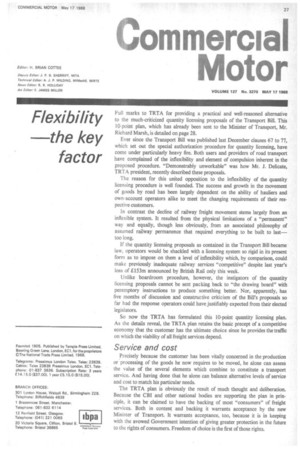ommerciai Motor
Page 29

If you've noticed an error in this article please click here to report it so we can fix it.
VOLUME 127 No. 3270 MAY 17 1968
Full marks to TRTA for providing a practical and well-reasoned alternative to the much-criticized quantity licensing proposals of the Transport Bill. This 10-point plan, which has already been sent to the Minister of Transport, Mr. Richard Marsh, is detailed on page 28.
Ever since the Transport Bill was published last December clauses 67 to 77, which set out the special authorization procedure for quantity licensing, have come under particularly heavy fire. Both users and providers of road transport have complained of the inflexibility and element of compulsion inherent in the proposed procedure. "Demonstrably unworkable" was how Mr. J. Delicate, TRTA president, recently described these proposals.
The reason for this united opposition to the inflexibility of the quantity licensing procedure is well founded. The success and growth in the movement of goods by road has been largely dependent on the ability of hauliers and own-account operators alike to meet the changing requirements of their respective customers.
In contrast the decline of railway freight movement stems largely from an inflexible system. It resulted from the physical limitations of a "permanent" way and equally, though less obviously, from an associated philosophy of assumed railway permanence that required everything to be built to last— too long.
If the quantity licensing proposals as contained in the Transport Bill became law, operators would be shackled with a licensing system so rigid in its present form as to impose on them a level of inflexibility which, by comparison, could make previously inadequate railway services "competitive" despite last year's loss of 153m announced by British Rail only this week.
Unlike boardroom procedure, however, the instigators of the quantity licensing proposals cannot be sent packing back to "the drawing board" with peremptory instructions to produce something better. Nor, apparently, has five months of discussion and constructive criticism of the Bill's proposals so far had the response operators could have justifiably expected from their elected legislators.
So now the TRTA has formulated this 10-point quantity licensing plan. As the details reveal, the TRTA plan retains the basic precept of a competitive economy that the customer has the ultimate choice since he provides the traffic on which the viability of all freight services depend.
Service and cost
Precisely because the customer has been vitally concerned in the production or processing of the goods he now requires to be moved, he alone can assess the value of the several elements which combine to constitute a transport service. And having done that he alone can balance alternative levels of service and cost to match his particular needs.
The TRTA plan is obviously the result of much thought and deliberation. Because the CBI and other national bodies are supporting the plan in principle, it can be claimed to have the backing of most "consumers" of freight services. Both in content and backing it warrants acceptance by the new Minister of Transport. It warrants acceptance, too, because it is in keeping with the avowed Government intention of giving greater protection in the future to the rights of consumers. Freedom of choice is the first of those rights.




























































































































